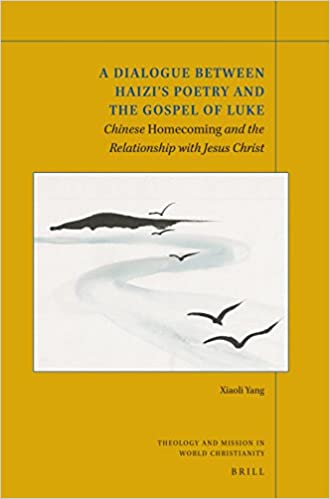A Dialogue between Haizi’s Poetry and the Gospel of Luke: Chinese Homecoming and the Relationship with Jesus Christ by Xiaoli Yang. Leiden: Brill, 2018. 348 pages. ISBN-10 9004361294, ISBN-13 978-9004361294. Available from Amazon.
Many who have worked in Christian mission recognize that it is through the arts that one often comes to grips with a culture’s most deep-seated values and longings. Of art’s many forms, poetry has a special way of expressing complexity in simplicity. Chinese civilization, with its centuries of poetic forms, traceable to numerous philosophical and religious worldviews, offers a deep well of resources for anyone pondering the intersection between Christ and culture. From Matteo Ricci’s hope to harmonize Christianity with Confucian musings on the “Lord of Heaven” to Y. T. Wu’s attempt to merge Christian faith with communism’s high revolutionary rhetoric, generations of theologians have attempted to understand God’s truth in relationship with China’s literary forms.
Anyone working with the church in contemporary China, however, is likely to have noticed that contextual theologies aligned with the traditions of Confucianism, Daoism, Buddhism, and even Marxism are often ignored. Why? The truth is that today’s Chinese experiences are hopelessly hybridized, a thick tangle of cultural threads knotted together by decades of dramatic, and often traumatic, revolutions. The result is that there is no clean line between the gospel and any single conception of Chinese culture because what constitutes “Chinese culture” today has become entangled beyond rational coherence. As such, any attempt to articulate a contextual theology for China without engaging the diffuse messiness of multiple worldviews is likely to fall short.
This is what makes Rev. Dr. Xiaoli Yang’s book so important. Her 2018 monograph engages the complexities of modern Chinese identity and culture by bringing the life and work of Haizi (海子), one of China’s most celebrated contemporary poets, into a dynamic dialogue with Jesus Christ as portrayed in the Gospel of Luke. She grounds her analysis in the Chinese value of “homecoming (回家).”
At the everyday level, homecoming is a desire to return to a place of safety and belonging, most commonly depicted as the family. At the spiritual level, it is the desire to return to the source of one’s self and creation itself. Yang selects Haizi as her focus because she believes he embodies the cultural conflicts and spiritual restlessness of the late-modern Chinese soul. By placing Haizi in conversation with Jesus, Yang is engaging in theological work that goes far beyond comparisons of sacred texts or stories. She is tackling the complexities of faith, culture, and society enmeshed in the messiness of modern change.
For those unaware, Haizi has become an icon of contemporary Chinese poetry and culture. Born in rural Anhui in 1964 with the given name of Zha Haisheng (查海生), Haizi’s childhood took place amidst the chaos of the Cultural Revolution. Excelling in his studies, Haizi was admitted to Peking University at just 15 years of age. The great contrast between his traditional village life and the Beijing’s urban development are a key dimension of his poetry.
Disillusioned with the legal profession he began his studies in, he turned his focus to poetry circa 1984, adopting “Haizi” as his pen name. By the 1980s, China’s economic reforms were in full swing. Many aspects of the social order Haizi was raised in had been turned upside down. The pace and degree of these changes frame much of Haizi’s poetry as a search for grounding. His writing ranges from dramatic lyrics to reflective verses filled with allusions to the spirituality of many religious traditions including Christianity, Buddhism, and Hinduism.
His mystic sensibilities were not, however, well received in his tragically short lifetime. On March 26, 1989, Haizi laid his body down on an active railway line in a town outside of Beijing with a copy of four books in hand, one of which was the Bible. He was only 25 years old when he was crushed under the weight of China’s raging progress. Since his high-profile death, Haizi’s poetry has been published and read across the country with an ever-growing body of literary scholarship written about him and his influence. There is no question that something about Haizi’s spiritual searching has resonated with millions of his fellow Chinese sojourners.
It has certainly resonated for Yang, who is not only a part of Haizi’s generation but is also a member of the Chinese diaspora living in Australia. As a Christian pastor and theologian, Yang has found some resolution to the same struggles of homelessness exhibited in Haizi’s words in the person of Jesus Christ. As such, her book is essentially a spiritual meditation on the interculturality of contemporary Chinese Christian experience in the form of a scholarly academic dissertation. A poet herself, Yang believes, “cross-cultural dialogue through poetry is an epistemological pathway to this intercultural home (p. 143).”
In her book, Yang engages the complexities of Haizi’s personal journey and poetic influences side by side with the life and teachings of Jesus in four parts under the themes of “roots,” “vision,” “journey,” and “arrival.” Her analysis of Haizi dives deep into his many influences from classical Chinese conceptions of Daoism involving the waxing and waning of Yin and Yang cosmology to German romanticism and the dialectic philosophy. Her analysis maps Haizi’s wrestling with the realities of Chinese Marxism’s emphasis on materiality in relationship to his undeniable fascination with the spiritually transformative potentials of art in Christianity and other religions. Each of these heavy academic topics is punctuated with samples of his poetry and grounded in what she argues is Haizi’s basic search for home.
In parallel, Yang presents an equally skillful exegetical analysis of the Gospel of Luke, gesturing toward Jesus Christ’s ministry as dynamic conversation partner that is resonant with Haizi’s search. Where Haizi struggles with displacement, Jesus expresses a sense of compassionate co-suffering at the cross. As Haizi seeks a home amidst numerous forms of art and spirituality, Jesus’s ministry embodies the extravagant hospitality of God’s reign. Each of her arguments are punctuated with a rich knowledge of Jesus’s own sociocultural contexts and the biblical Greek in which it was written. Altogether, the beauty of Yang’s work is in the way she is able to dance between the registers of academic analysis and spiritual formation. The result is a tour de force for the mind and the heart that actively engages the manifold layers of contemporary Chinese experience beyond simplistic categories.
Yang’s monograph is currently being translated into Chinese under the title, “一場海子詩歌與路加福音的對話:中國人的回家之路與耶穌基督的關係”with the hope that her analysis will chart new pathways for other Chinese searching for answers to similar questions. Building on the themes in her book, Yang has also recently published an article in Mission Studies entitled, “Towards a Chinese Theology of Displacement: The Poetic Journey of a Chinese Migrant.” All of this makes Yang a premier voice in intercultural theology from a Chinese standpoint and an important resource for anyone working with Chinese Christians throughout the diaspora. If you’re interested in learning more about Yang’s perspective into the role of the arts in mission and intercultural theology, watch this video conversation from Joseph Graham Hill’s “Global Church Project.”
Image credit: Wladislav Glad via Unsplash

Easten Law
Easten Law is the Assistant Director for Academic Programs at the Overseas Ministries Study Center at Princeton Theological Seminary (OMSC@PTS). His research focuses on lived theology, public life, and religious pluralism in contemporary China. He completed his PhD at Georgetown University, an MDiv at Wesley Theological Seminary, and an MA …View Full Bio
Are you enjoying a cup of good coffee or fragrant tea while reading the latest ChinaSource post? Consider donating the cost of that “cuppa” to support our content so we can continue to serve you with the latest on Christianity in China.
